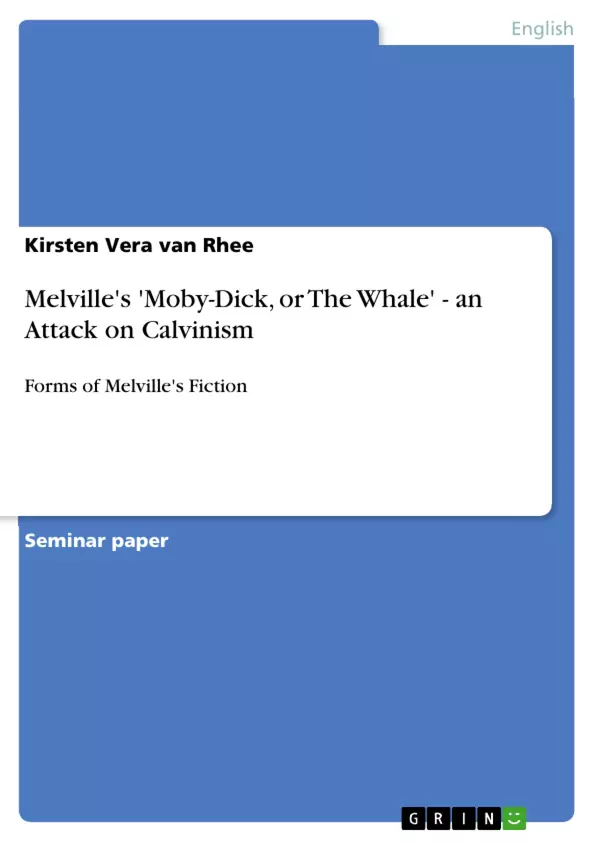1. Introduction
The publication of Melville’s Moby-Dick or, The Whale in 1851 caused a vast range of attitudes toward the book, approaching the novel in various ways. Among those, central motives of creation and quest played an important role in interpreting the author’s masterpiece
as a work that sought to reach new fundamental religious insights
by challenging the Calvinist tradition of Melville’s time.
This paper is an attempt to show how far Melville’s Moby-Dick succeeded in attacking the Calvinist principles of a theocratic and evil view of the world, constructing a literary scene of scepticism and bigotry that crosses the normal boundaries in its quest for what is beyond the universal system.
Inhaltsverzeichnis (Table of Contents)
- Introduction
- Melville and the religious milieu of his time
- Scepticism and bigotry in Moby-Dick
- Ishmael and the Calvinist elements
- Ishmael - a Biblical name.
- Ishmael - an outcast.
- Calvinism versus scepticism
- Father Mapple and the sermon
- Ishmael's response to the sermon
- Ahab and the Calvinist elements
- Ahab a biblical name
- Ahab's cosmic fury and bigotry
- Ahab and the sermon
- Ishmael and Ahab - a comparison
- Conclusion
Zielsetzung und Themenschwerpunkte (Objectives and Key Themes)
The purpose of this paper is to explore how Herman Melville's "Moby-Dick or, The Whale" critiques the Calvinist religious tradition prevalent during his time. The paper focuses on the ways in which Melville's novel challenges Calvinist principles, particularly in relation to the concepts of a theocratic and evil world view, and how the characters of Ishmael and Ahab embody a sense of skepticism and bigotry that transcends conventional boundaries in their quest for truth.
- Melville's religious crisis and his search for a just God
- The clash between Unitarians and Calvinists in 19th-century America
- The use of skepticism and bigotry in the novel's portrayal of religious questioning
- The characters of Ishmael and Ahab as figures of spiritual crisis and their contrasting approaches to religious truth
- The challenges to traditional Calvinist dogma posed by Melville's work
Zusammenfassung der Kapitel (Chapter Summaries)
The introduction sets the stage for the paper's argument by outlining the diverse interpretations of "Moby-Dick" and its focus on the themes of creation and quest. The paper aims to demonstrate how Melville uses his novel to challenge the prevailing Calvinist doctrines of his time.
Chapter 2 delves into the religious landscape of Melville's era, highlighting the tension between Unitarians and Calvinists. It explains the contrasting beliefs of these groups, particularly regarding God's role in human life and the nature of sin. This chapter also explores Melville's personal journey from accepting Calvinist principles to questioning them, a shift that shaped his worldview and fueled his literary critiques.
Chapter 3 introduces the central figures of Ishmael and Ahab as embodiments of skepticism and bigotry, representing the novel's exploration of religious doubt and the search for truth. It emphasizes how Ishmael, as the narrator, reflects a state of intense skepticism that stems from the Pequod's tragic fate.
Chapter 4 dives into the Calvinist influences on Ishmael's character. It analyzes the symbolism of his name, his outcast status, and his complex relationship with the sermon delivered by Father Mapple. This chapter explores the interplay between Ishmael's doubts and the traditional Calvinist doctrines he grapples with.
Chapter 5 examines the Calvinist elements that shape Ahab's character, focusing on the significance of his biblical name, his furious quest for vengeance, and his encounter with Father Mapple's sermon. This chapter reveals the ways in which Ahab's actions are intertwined with themes of cosmic justice and human depravity.
Chapter 6 establishes a comparative analysis of Ishmael and Ahab, highlighting their contrasting approaches to religion and their symbolic roles within the narrative. It emphasizes how these two figures represent contrasting perspectives on faith and the human condition.
Schlüsselwörter (Keywords)
The key concepts explored in this analysis include Calvinism, skepticism, bigotry, religious doubt, theocratic worldview, creation, quest, spiritual crisis, Ishmael, Ahab, and the novel "Moby-Dick."
Frequently Asked Questions
Why is "Moby-Dick" seen as an attack on Calvinism?
Melville challenges the Calvinist view of a theocratic, evil world and predestination through the spiritual crises of his characters.
What does the name Ishmael symbolize?
In the Bible, Ishmael is an outcast; in the novel, he represents a skeptical survivor who questions traditional religious dogmas.
How does Captain Ahab represent cosmic fury?
Ahab's quest to kill the whale is a rebellious act against a God he perceives as malicious or indifferent, embodying religious bigotry.
What is the significance of Father Mapple's sermon?
The sermon on Jonah provides a traditional Calvinist framework of obedience that both Ishmael and Ahab struggle with or reject.
How did 19th-century religious tension influence Melville?
The clash between rigid Calvinism and the more liberal Unitarianism shaped Melville’s personal skepticism and literary themes.
- Quote paper
- Kirsten Vera van Rhee (Author), 1994, Melville's 'Moby-Dick, or The Whale' - an Attack on Calvinism, Munich, GRIN Verlag, https://www.grin.com/document/176967



